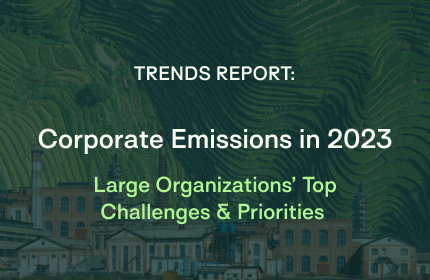Corporate ESG reporting was once a voluntary activity, but as new climate regulations emerge in the EU and US, companies now must meet stringent emissions reporting requirements. One prominent feature of new climate regulation is the requirement that ESG reports undergo third-party assurance. But not all assurance is the same. Some regulations require limited assurance, while others require reasonable assurance—and still other regulations require both forms of assurance depending on the company’s size and the timing of the report.
It’s essential to understand the nuances of these forms of assurance before you begin the ESG reporting process.
How is reasonable assurance different from limited assurance?
Reasonable assurance is the top tier of ESG verification. It involves a comprehensive, in-depth review of your ESG data and the processes that led to your ESG report. The assurance provider digs deep, challenging assumptions, scrutinizing evidence, and tracing data to its source to ensure accuracy.
In contrast, limited assurance is less intensive.Verifiers focus on ensuring that the information that they’ve been provided with is plausible and that internal controls and processes are appropriate, rather than tracing each claim to its source to fact-check it. While reasonable assurance aims to slash risks of material misstatements, limited assurance is appropriate when the risk of a material misstatement is low or acceptable to begin with.
Limited assurance advantages
Don’t underestimate limited assurance—it offers significant benefits for its scope. It’s cost-effective and quicker to implement, making it ideal for ESG reporting newcomers or those with tight budgets. Limited assurance offers a solid starting point, allowing you to build credibility without an undue burden on resources. It’s a solid step for organizations looking to test the waters or those with less complex ESG data.
Reasonable assurance advantages
Reasonable assurance provides a higher level of confidence in your ESG data, which can be crucial for high-stakes decisions or when targeting premium sustainability indices and stringent regulatory requirements. Reasonable assurance signals to stakeholders that you’re serious about transparency and accountability. It’s the gold standard that can set you apart in a crowded ESG landscape, and it looks like it will increasingly be the regulatory baseline for very large companies with complex value chains and many emissions sources.
Limited vs. reasonable assurance: which is right for your ESG report?
In some circumstances, regulations will make this choice very straightforward—based on company size, location, or other factors, the decision might be made for you.
However, for others, choosing between limited assurance and reasonable assurance will not be as cut-and-dry. Consider your resources, stakeholder demands, and strategic goals. Are you a sustainability pioneer looking to set industry standards—or catch up with competitors who’ve set the standards for you? Reasonable assurance might be your best bet. Just starting your ESG journey? Limited assurance could be your springboard to future ESG growth. Remember, you can always start with limited assurance and scale up as your ESG reporting matures.
ESG assurance frameworks and standards
Key standards guide the ESG assurance landscape:
- ISAE 3000 (Revised): Developed by the International Auditing and Assurance Standards Board (IAASB), this is a comprehensive standard for both reasonable and limited assurance engagements on non-financial information, including ESG reports.
- ISO 14064-3: This is part of the ISO series of standards related to GHG accounting. It specifies principles and requirements for verifying and validating GHG statements and can be used for both limited and reasonable assurance engagements.
Conclusion: In ESG reporting, standing still is moving backward
Whether you opt for limited assurance or reasonable assurance, the field of ESG reporting is changing every day. The longer companies put off their first GHG inventory and ESG report, the further behind they fall in comparison to their competitors. Organizations face growing pressure to transparently measure and manage their environmental impact, with greenhouse gas (GHG) verification playing an increasingly critical role.
Ready to dive deeper into GHG verification? Download our comprehensive white paper, GHG Verification: Why it matters and how it works. This guide, created in collaboration with JS Held, a consultancy with decades of experience in GHG accounting and verification, answers crucial questions like:
- Why does GHG verification matter?
What are the four key characteristics to look for when selecting a verifier?
What goes on behind the scenes during a GHG verification?
Get the insights you need to make informed decisions for your organization. Download the white paper now and take the first step toward GHG verification.


